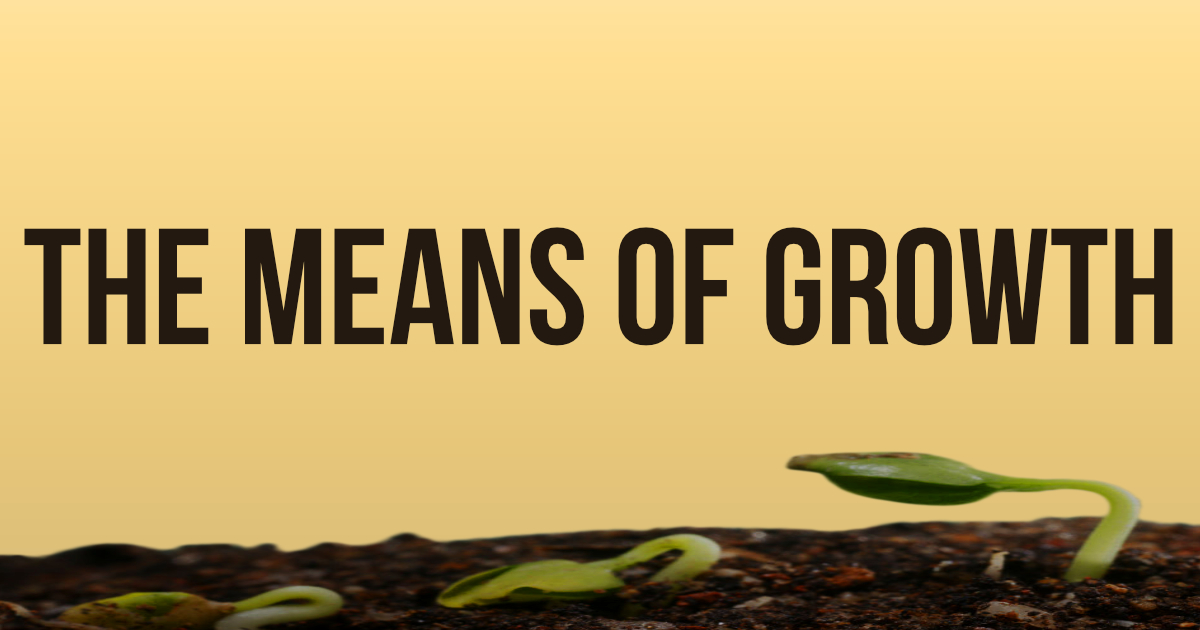 The Bible describes five different methods through which we can grow spiritually: (1) Scripture, (2) prayer, (3) fellowship, (4) ministry, and (5) suffering.
The Bible describes five different methods through which we can grow spiritually: (1) Scripture, (2) prayer, (3) fellowship, (4) ministry, and (5) suffering.
The first two (the Bible and prayer) are our spiritual food, and the last two (ministry and suffering) are our spiritual exercise. Under this analogy, the middle one (fellowship) is like the gymnasium where we workout. If we want to build muscle, we need to eat, lift, and get to the gym.
If we never get ourselves to the GYM, we will never have an opportunity to get in shape. Similarly, if we never make it to fellowship, we do not give ourselves an opportunity to hear from God or serve.
If we never EAT, we will pass out or get sick. Similarly, if we try to serve Christ without a habit of prayer and Bible study, we become spiritually sick and fragile.
If we never LIFT, we will become scrawny or obese! Similarly, those who sit under countless hours of Bible study and prayer without serving become spiritual gluttons. They are poured into by God, but they never pour out.
As you can see, we need all five means of growth if we are going to grow spiritually. If we only seek four out of the five, this will not result in 80% sanctification; it will result in total spiritual dysfunction! This would not be like a boat with four out of five engines running. It would be more like a car with only three wheels or a table with only three legs.
When counseling other believers, the first thing to investigate is whether or not they are neglecting one or more of the means of growth. This is the cause of the majority of spiritual problems. While people are certainly complex, we shouldn’t assume that a person has an exotic spiritual disease, unless we cover the basics first. If they are neglecting the means of growth, it shouldn’t surprise them that something is wrong in their lives.
Consider the story of a man who goes to the doctor for intense flu symptoms (e.g. vomiting, fever, chills, etc.). The doctor labors over his patient for several days, asking dozens of questions, running multiple tests, and holding him in observation. Finally, it hits him. Food poisoning! It must’ve been something he ate. So he asks the man if he had eaten any spoiled food—perhaps he has food poisoning.
The man shakes his head and says, “No way, Doc. It can’t be food poisoning.”
“Why not?” the doctor asks.
“It couldn’t have been something I ate,” says the patient. “I haven’t eaten anything in a week and a half.”
At this point, the doctor slaps his hand to his forehead, shakes his head, and closes his file. “Well, case closed!” he says. “You’re sick because you haven’t been eating for 10 days! Just get a hamburger on the way home from the hospital, and you’ll be fine!”
While this story is fictional, it illustrates an important point: If we aren’t eating or drinking anything, we should expect to be sick. Likewise, if we aren’t feeling close to God, we should see if we’ve been drawing near to him through the Bible and prayer (Jas. 4:7). If this hasn’t been happening, we should get back to this crucial spiritual discipline.
While there are complexities to the Christian life, we shouldn’t overcomplicate things too much. 90% of the Christian life is getting really good at the basics of spiritual growth. To illustrate this, there was a college athlete several years ago who went pro. When a reporter asked him what he learned about the game since he transitioned pro, he said, “Not too much… I just learned to work on the basics even harder.”
Conclusion
We need to remember that the means of growth are not works that make God happy. Instead, these are the venues through which we encounter God and become empowered by him. Consider a spoiled little child who comes downstairs for dinner. His father has prepared a delicious meal of his favorite food, but he whines that it was so much work to walk down the stairs to come to dinner. Then he complains that his food isn’t cut up into tiny pieces for him, and he whines that he has to chew it and swallow it all by himself. Of course this would be insane to witness! We’d tell the kid that it isn’t work to sit down and eat dinner, when someone has purchased and cooked the meal for you.
And yet, many believers understand the means of growth in the same way. We might feel like it is work to sit down and pray or read the Bible, but God doesn’t see it this way. This is food for us to consume and be nourished by.
Articles on the Means of Growth
Each of these articles explain the importance of each means of growth, including Scriptures on each topic. Then each article offers practical suggestions for how to develop this particular spiritual discipline.
